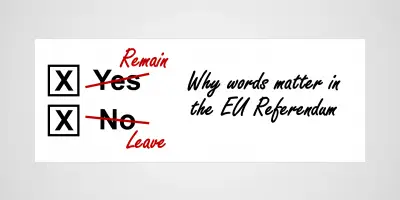By the end of 2017, the people of the United Kingdom are being asked one important question: are we in or out? Yes or no? Remain or leave? Courage or stagnation? Arrogance or cooperation? Isolationism or internationalism? Or possibly even federalism? OK, there are quite a few questions.
The Electoral Commission has recommended a crucial change to the imminent EU referendum. But what is it about the referendum that they have taken umbrage at? Maybe they attacked the continued delays to its progress, or perhaps the unspecified reforms, or the economic purgatory that some say we will be entering in the face of a potentially fundamental change to our trade and position in Europe?
No, it’s the words. They wanted a change of words, which PM David Cameron has, willingly or unwillingly, obliged them with.
Here are the original words:
‘Should the United Kingdom remain a member of the European Union?’
[ ] ‘Yes!’ [ ] ‘No!’
Here are the new words:
‘Should the United Kingdom remain a member of the European Union or leave the European Union?’
[ ] ‘Stay!’ [ ] ‘Leave!’
*exclamation marks have been added for emphasis.
Farage, too, was fretting about the inevitable confusion that the ridiculously complicated original question would undoubtedly induce across the country. Well, he can now sleep easy, sighing with relief that the new question ‘is much clearer’ and shouldn’t completely baffle the British public (we can only hope, Nige).
On the surface, nothing has dramatically changed: the options remain, essentially, completely the same. But what this panic over wording has demonstrated is the hype around positive campaigning: ultimately, the ‘No’ camp do not want to be stuck with a negative campaign up against the ‘Yes’ men (and women).
The wording has been deliberately designed this way: if the question had been ‘Should the United Kingdom leave the European Union?’ then Farage and the Eurosceptic brigade could be the Jim Careys of the referendum, yes-ing themselves into a positive (literally) frenzy. Because saying ‘yes’ sounds great. It sounds optimistic, uplifting. ‘Yes! I’ll marry you,’ ‘yes! Let’s climb Everest,’ ‘Yes! I’m a doer and, by Jove, I like to get things done.’ It would transform the Eurosceptics into the Confederation of British Optimists.
Which is why the government, whose Numero Uno definitely does not want his legacy defined by a Brexit, is staunchly reserving their right to saying ‘Yes.’ ‘Yes!’ to… staying the same, but maybe with slight modifications or ‘No!’ if you want active change. Actually, ‘Yes’ does seem a rather strange buzz-word of the ‘Remain’ campaign. Maybe Farage has a point.
But does the wording of the referendum really have the power to change the result? Yes and no. Referendums aren’t determined by the positive vs negative sounding answers. The ‘Oxi’ vote in the Greek EU question and the ‘No’ vote in the Scottish independence referendum both triumphed against their seemingly negative odds. However, despite the rise of authentic Corbynism and Boris blunderism, politicians still feel spin reigns supreme.
Yes, the feeling around a campaign can boost its outcome, turning a near miss into an epic loss or scraped win into a storming triumph: look at the ‘Cool Britannia’ wave that swept Tony Blair all the way to Number 10 in 1997. However, the general public is a lot more astute than they are given credit for. The ‘No’ vote in Scotland was unexpected because the ‘Remain’ campaign was so doomy and gloomy, that even dedicated Unionists seemed somewhat depressed by the result. But the ‘No’ vote still won. If the rise of the ‘authentic’ politicians can show us anything, it should be that the power of spin is limited. It can exacerbate, emphasise and boost a cause. It is important. But it cannot transform a good idea into a bad one, or manipulate the majority into a mistake.
Instead, both camps should focus on making their campaigns positive, before accusing the other of a pre-ordained outcome due to a circumstance of wording. And for Nigel to invest in some Night Nurse if he’s still finding the ‘No’ vote uneasy. Personally, I’m in favour of borrowing from the best.
To EU or not to EU?
[ ] To EU [ ] Not To EU




